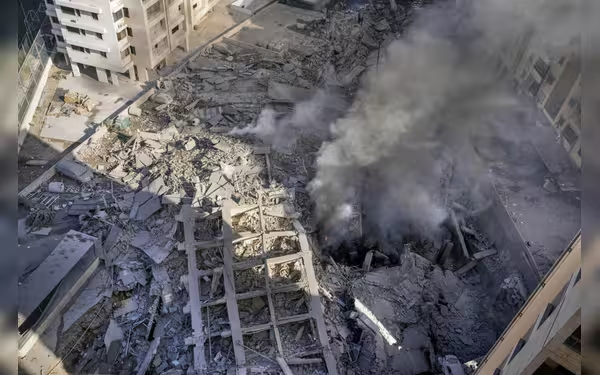Saturday, November 16, 2024 05:53 PM
Israeli Airstrikes Target Central Beirut, Resulting in Casualties
- Israeli airstrikes kill 22 in central Beirut.
- Hezbollah figure reportedly targeted in the attack.
- Ongoing violence escalates amid regional tensions.
 Image Credits: arabnewspk
Image Credits: arabnewspkIsraeli airstrikes in central Beirut result in 22 deaths and 117 injuries, escalating tensions in the region amid ongoing conflict with Hezbollah.
In a tragic escalation of violence, Israeli airstrikes have struck central Beirut, resulting in the deaths of at least 22 individuals and injuring 117 others, according to the Lebanese health ministry. This incident marks a significant intensification of hostilities in the region, particularly as it targets a densely populated area known for its residential buildings and local communities. The strikes are reported to have aimed at a Hezbollah figure, highlighting the ongoing conflict between Israel and the Iran-backed militant group.
Over the past two weeks, Israeli forces have consistently targeted the southern suburbs of Beirut, a stronghold for Hezbollah. However, Thursday's air raid represents only the third instance of the city center being attacked. The Lebanese health ministry confirmed the casualties, stating, "The Israeli enemy’s attacks on the capital Beirut this evening resulted in a new toll of 22 people killed and 117 injured." This statement underscores the severe impact of the strikes on civilian life.
A Lebanese security source, who chose to remain anonymous due to the sensitive nature of the information, indicated that the airstrikes were aimed at a Hezbollah official who was known to frequent the targeted locations. As of now, it remains unclear whether this official was among the casualties.
The strikes specifically hit the neighborhoods of Nweiri and Basta. Reports from the National News Agency (NNA) detailed that the first strike targeted the third floor of an eight-story building in Nweiri, while a second strike hit a four-story building in Al-Basta Al-Fouqa. Eyewitness accounts describe the devastation, with two old buildings collapsing and windows of nearby homes shattered due to the force of the explosions.
Rescue operations are currently underway, with local residents and emergency services working tirelessly to pull survivors from the rubble. Some individuals have been seen being carried away on stretchers, while firefighters are battling blazes in the affected buildings. The scene is chaotic, with plumes of smoke rising between tightly packed structures, a stark reminder of the violence that has engulfed the area.
This recent attack is part of a broader pattern of escalating violence in Lebanon, particularly since the onset of the Gaza war. Earlier this month, an Israeli air raid targeted a Hezbollah-run emergency services facility, resulting in the deaths of seven workers. Additionally, a drone strike on September 30 in Beirut's Cola district killed three members of the Popular Front for the Liberation of Palestine (PFLP). The ongoing exchanges of fire between Hezbollah and Israel have become a near-daily occurrence, contributing to a climate of fear and instability.
As the situation continues to unfold, the humanitarian implications are dire. With over 1,200 people reported killed and more than one million displaced since the escalation began on September 23, the need for a peaceful resolution becomes increasingly urgent. The international community must pay close attention to these developments, as the consequences of this conflict extend far beyond the borders of Lebanon, affecting regional stability and global security.













